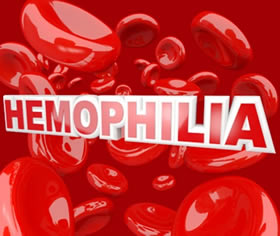Difference between Hemophilia A and Hemophilia B
Key Difference: Hemophilia A and Hemophilia are two different types of Hemophilia, caused by the deficiency of coagulation factor VIII and IX respectively.
 Hemophilia is a bleeding disorder which occurs due to deficiency or absence of a specific protein which is required for blood to clot. Due to this deficiency, a person bleeds longer after an injury. This specific protein is basically related to clotting factor which is a series of blood proteins. Human body contains 12 clotting factors which contribute in the process of clotting.
Hemophilia is a bleeding disorder which occurs due to deficiency or absence of a specific protein which is required for blood to clot. Due to this deficiency, a person bleeds longer after an injury. This specific protein is basically related to clotting factor which is a series of blood proteins. Human body contains 12 clotting factors which contribute in the process of clotting.
These are numbered in Roman numerals from I to XII. It is a rare bleeding disorder which falls in the category of inherited disorders. Common signs of Hemophilia include large bruises, bleeding for a longer time after getting a cut, bleeding into muscles and joints, spontaneous bleeding, etc.
 Hemophilia A and Hemophilia B are two types of Hemophilia. Hemophilia A is also known as Classical Hemophilia, whereas Hemophilia B is also known as Christmas disease sometimes. The primary difference between them is that Hemophilia A occurs due to deficiency of factor VIII, whereas hemophilia B occurs due to deficiency of factor IX. X chromosomes contain the genes for both these factors however, they are not located closely.
Hemophilia A and Hemophilia B are two types of Hemophilia. Hemophilia A is also known as Classical Hemophilia, whereas Hemophilia B is also known as Christmas disease sometimes. The primary difference between them is that Hemophilia A occurs due to deficiency of factor VIII, whereas hemophilia B occurs due to deficiency of factor IX. X chromosomes contain the genes for both these factors however, they are not located closely.
It is important to mention that a person suffering from hemophilia can lack only either of the factors - VIII or factor IX. It is not possible to suffer from deficiency of both these factors together. Males are more prone to this disease in comparison to females. Signs and symptoms of both A and B are similar.
They both are defined by using three degrees of severity which are - severe, moderate and mild. They are generic disorders, and thus oral medication is not able to assist much in the treatment. The standard treatment remains to be the blood transfusion or proving the missing factors through an intravenous route.
Comparison between Hemophilia A and Hemophilia B:
|
|
Hemophilia A |
Hemophilia B |
|
Caused by |
Deficiency of factor VIII |
Deficiency of factor IX |
|
Also known as |
Classical hemophilia |
Christmas disease |
|
Common cases |
More common |
About 5 times less common than hemophilia A |
|
Severe disease |
More likely to suffer from severe disease |
Less likely to suffer from severe diseases |
|
Treatment |
Moderate to severe – generally plasma concentrate of factor VIII is given Mild – intake of desmopressin |
Standard treatment – regular transfusion of factor IX |
|
Diagnosis |
Testing the level of factor VIII coagulation activity in the blood |
Measuring the level of factor IX activity in the blood |
Image Courtesy: pentagonpost.com
Image Courtesy: lookfordiagnosis.com









Add new comment